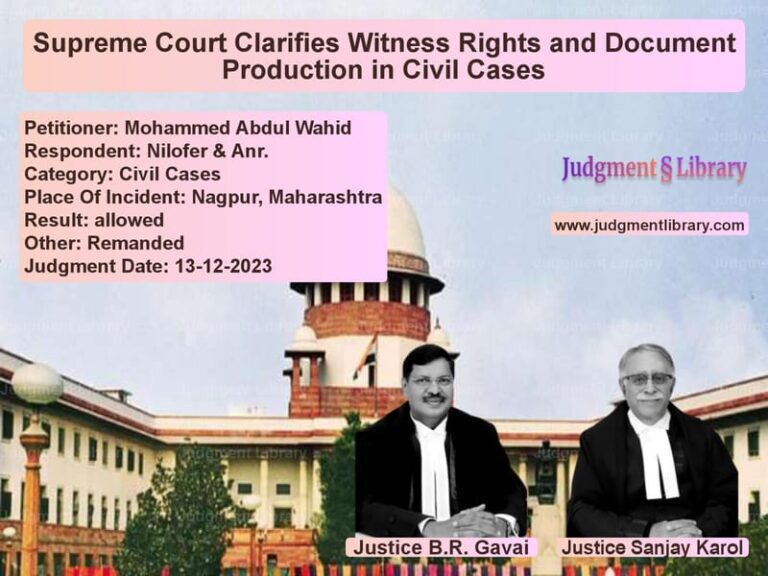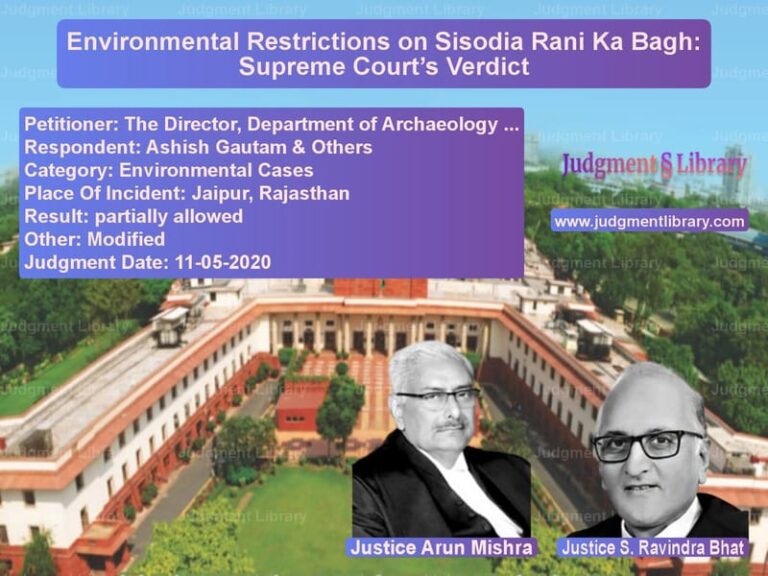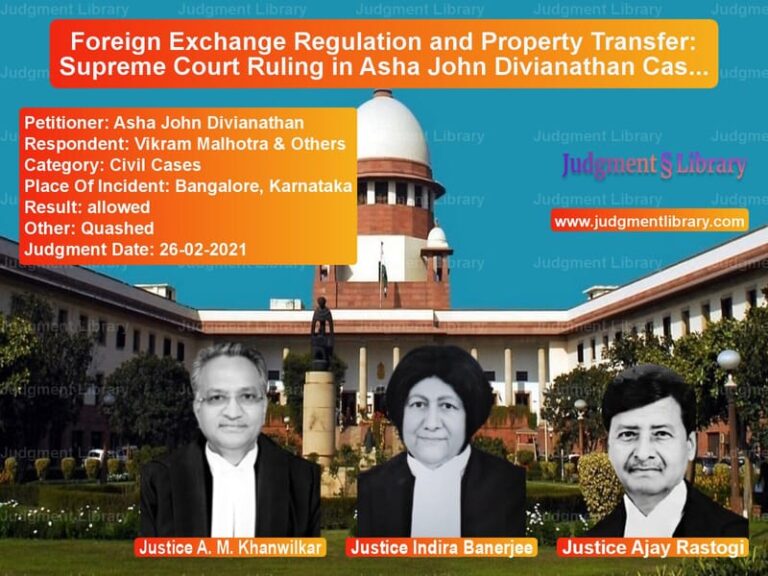Supreme Court Upholds Conviction of Indian Airlines Official in Ticket Forgery Case
The Supreme Court of India has upheld the conviction of Surinder Dogra, a former Traffic Superintendent at Indian Airlines, for committing forgery and corruption in a ticket manipulation scam. The Court dismissed the appeal challenging the findings of the Trial Court and the High Court, reaffirming the integrity of documentary evidence and handwriting analysis in criminal convictions.
Background of the Case
The case dates back to November 19, 1997, when the appellant, while on duty at the Indian Airlines ticket sale counter at Jammu Airport, allegedly issued a forged flight ticket. The ticket, initially prepared as an infant ticket under the name of ‘Master Azim,’ was tampered with and converted into an adult ticket for ‘Mr. Vikram’ to travel from Jammu to Delhi.
The case came to light when an internal audit revealed inconsistencies in the ticket records. Based on a complaint by Indian Airlines’ Vigilance Manager, the Central Bureau of Investigation (CBI) launched an investigation, leading to the filing of a charge sheet against the appellant under Sections 420 (cheating), 468 (forgery for the purpose of cheating), and 471 (using a forged document as genuine) of the Ranbir Penal Code (RPC) and Section 5(1)(d) read with Section 5(2) of the Prevention of Corruption Act, 1988.
Key Legal Issues
- Whether the prosecution established beyond a reasonable doubt that the appellant forged the ticket.
- The evidentiary value of handwriting analysis in proving the allegations.
- Whether the lower courts erred in convicting the appellant based on circumstantial evidence.
Arguments by the Appellant
The appellant’s counsel contended that:
- The conviction was based purely on circumstantial evidence, and no direct witness testified to seeing the accused commit the forgery.
- The handwriting expert’s report was inconclusive and should not have been the primary basis for conviction.
- The alleged manipulation could have been carried out by other employees, as multiple individuals handled ticket issuance.
- The High Court failed to consider the appellant’s defense and wrongly upheld the Trial Court’s conviction.
“The prosecution has failed to prove beyond a reasonable doubt that the appellant was responsible for the ticket forgery. Circumstantial evidence alone cannot form the basis of a conviction in a case of forgery.”
Arguments by the Respondent (CBI)
The CBI, representing the prosecution, argued:
- The appellant was the sole officer manning the ticket counter on the day of the incident, making him the only person who could have tampered with the ticket.
- The forged ticket bore the appellant’s handwriting, which was confirmed by a forensic expert.
- The manipulation resulted in wrongful pecuniary advantage to a third party, proving fraudulent intent.
- The airline suffered financial losses due to the fraudulent ticketing practice.
“The documentary and forensic evidence overwhelmingly establish the guilt of the accused. His deliberate act of altering an airline ticket constitutes a clear case of fraud and corruption.”
Supreme Court’s Observations
The Supreme Court examined the evidence and upheld the findings of the lower courts. The key observations included:
- The auditor coupon and flight coupon issued on November 19, 1997, were in the handwriting of the appellant.
- The forensic report confirmed that the ticket was tampered with after issuance, with clear signs of overwriting.
- The appellant was in charge of the ticket counter at the relevant time, making it improbable that any other employee committed the forgery.
- The corruption charges were well-founded as the accused facilitated unauthorized ticketing, violating financial rules of Indian Airlines.
“The appellant alone had access to and control over the ticketing process on the relevant date. The sequence of events and the forensic findings confirm his direct involvement in the fraudulent act.”
Final Judgment
The Supreme Court ruled:
“The conviction of the appellant under Sections 420, 468, and 471 of the Ranbir Penal Code and Section 5(1)(d) read with Section 5(2) of the Prevention of Corruption Act, 1988, is upheld. The appeal is dismissed, and the sentence imposed by the lower courts shall remain in force.”
The appellant was sentenced to six months of simple imprisonment for each offense and a fine of Rs. 5,000 per charge, with sentences to run concurrently.
Impact of the Judgment
This ruling reinforces the legal principles governing fraud and forgery in public service:
- Confirms the evidentiary value of forensic handwriting analysis in criminal cases.
- Establishes that circumstantial evidence, when strongly corroborated, is sufficient to uphold a conviction.
- Strengthens anti-corruption enforcement within public sector enterprises.
- Ensures accountability among employees handling financial transactions in government and semi-government organizations.
By affirming the lower courts’ decisions, the Supreme Court has underscored the importance of integrity and accountability in public administration, sending a strong message against fraudulent practices in ticketing and financial transactions.
Petitioner Name: Surinder Dogra.Respondent Name: State Through Director CBI.Judgment By: Justice Sudhanshu Dhulia, Justice Prashant Kumar Mishra.Place Of Incident: Jammu Airport, Jammu & Kashmir.Judgment Date: 21-02-2025.
Don’t miss out on the full details! Download the complete judgment in PDF format below and gain valuable insights instantly!
Download Judgment: surinder-dogra-vs-state-through-direct-supreme-court-of-india-judgment-dated-21-02-2025.pdf
Directly Download Judgment: Directly download this Judgment
See all petitions in Fraud and Forgery
See all petitions in Bail and Anticipatory Bail
See all petitions in Judgment by Sudhanshu Dhulia
See all petitions in Judgment by Prashant Kumar Mishra
See all petitions in dismissed
See all petitions in Modified
See all petitions in supreme court of India judgments February 2025
See all petitions in 2025 judgments
See all posts in Criminal Cases Category
See all allowed petitions in Criminal Cases Category
See all Dismissed petitions in Criminal Cases Category
See all partially allowed petitions in Criminal Cases Category







